We all love our cats, but if they’re suddenly full of energy as soon as the sun goes down and you’re trying to get to sleep, it can be a little frustrating. Cats are naturally more active at night time, and your kitty may want to play just when you want to rest.
Luckily, there are quite a few things that you can do to calm a hyper cat at night before you head off to bed. Some are super simple and can be tried right away; others need a little more time to organize. Either way, we’re sure that our tips will help you get a better night’s sleep and help your kitty get the attention they deserve.
The 12 Ways to Calm a Cat Down at Night
1. Add Enrichment to Your Cat’s Routine
The busier your cat is during the day, the less likely they’ll want to play after dark. Making sure your cat has plenty of enrichment activities is a great way to keep them engaged and active during daylight hours.
Think about adding things like cat trees, food puzzles, and interactive toys. If your cat is an indoor cat but you have a backyard, you could even build a cat enclosure so they can spend plenty of time watching the local wildlife.
Installing a bird feeding station near a window is also a way to give your cat something interesting to watch during the day.
Looking for toys that will cater to the many needs of your cat? The Hepper Hi-lo Cat Scratcher is one of our favorite cat products, and it will encourage your cat to get active. Its clever three-angle design offers multiple ways for your cat to climb, stretch, and exercise. Made of a sturdy plywood base and a replacement cardboard insert, this scratcher is an option that cats can enjoy for years to come. If your cat requires a little encouragement for self-play, the Hepper Catnip Mice Toy Set is a fantastic choice for their instinctual needs. Made with natural, bite-resistant hessian fabric and filled with organic catnip. Cats can satisfy their natural prey instincts while getting the physical activity they need to thrive.
| Image | Product | Details | |
|---|---|---|---|
Great for Exercise

|
Hepper Hi-Lo Cat Scratcher |
|
Check Price |
Encourages Self-Play
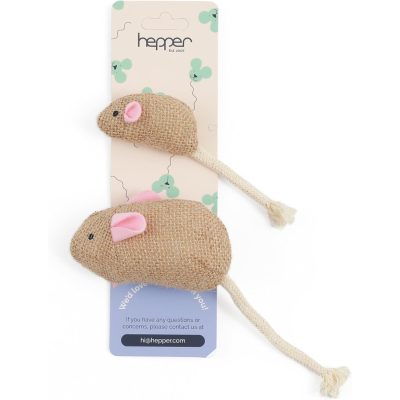
|
Hepper Catnip Mice Toy Set |
|
Check Price |
At Catster, we've admired Hepper for many years, and decided to take a controlling ownership interest so that we could benefit from the outstanding designs of this cool cat company!
2. Keep Your Cat Out of the Bedroom
We agree that it’s lovely to cuddle your cat on your bed, but if they keep waking you up, one of the best things to do is shut the bedroom door! That way, your cat can’t pounce on your feet in the middle of the night or meow in your face when they get hungry and want a snack.
3. Play With Your Cat in the Evening
Try to work with your cat’s natural desire to play in the evenings by setting aside time to engage with them before you go to bed. Using a wide selection of toys that encourage plenty of movement will be the best way to tire your cat out so you can get sleep later in the night.
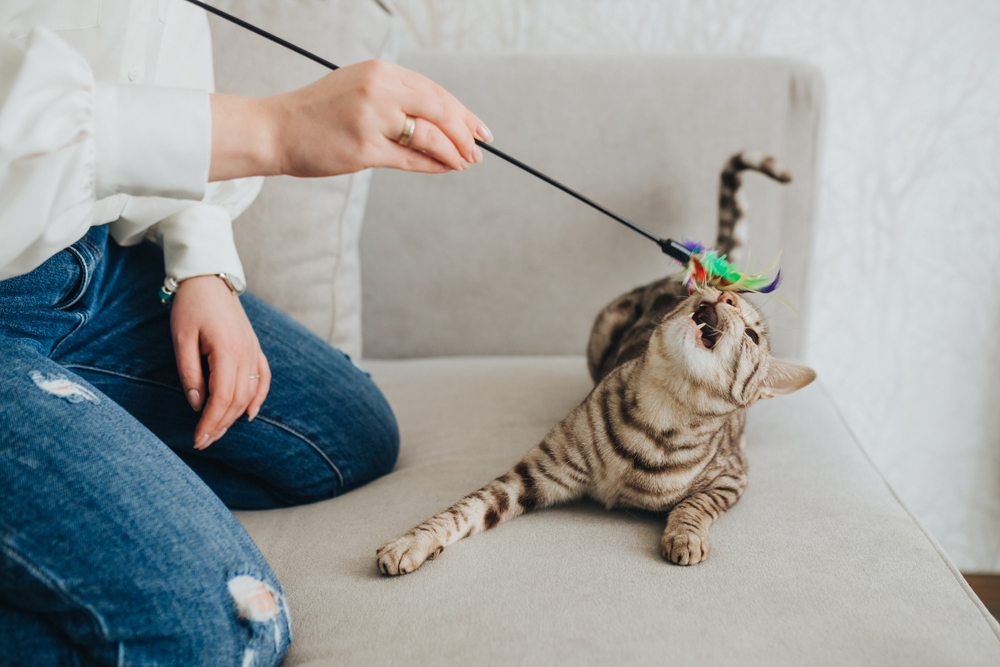
4. Feed Your Cat Just Before Bedtime
Cats naturally have a rhythm to their days that involves hunting and catching prey, eating, grooming themselves, and then sleeping. The best way to encourage your cat to sleep is to follow this rhythm.
After you’ve had a good play session with your cat, to mimic the hunting and catching part of their routine, it’s a great time to feed your cat. This can give them the satisfaction that they naturally would feel if they caught something in the wild and then settled down to eat it.
After your cat has a full tummy, they’ll be ready for a nice grooming session and then sleep. Timing the start of their sleep cycle to correspond with your bedtime means there’s less chance of them waking you up if they’re full of energy as you’re going to bed.
5. Invest in an Automatic Feeder
If your cat gets hungry in the night and can’t find any food, then they’re going to come looking for their human to provide them with snacks.
Using an automatic feeder is a great way of giving your cat a limited amount of food during the night without having to get it yourself! Your cat will soon learn to sit and wait for the feeder to dispense their food, rather than coming and waking you up.
You can also get slow feeders in the shape of little mice. You can fill these with kibble before you go to bed and place them around the house for your cat to sniff out and “hunt” while you’re sleeping.
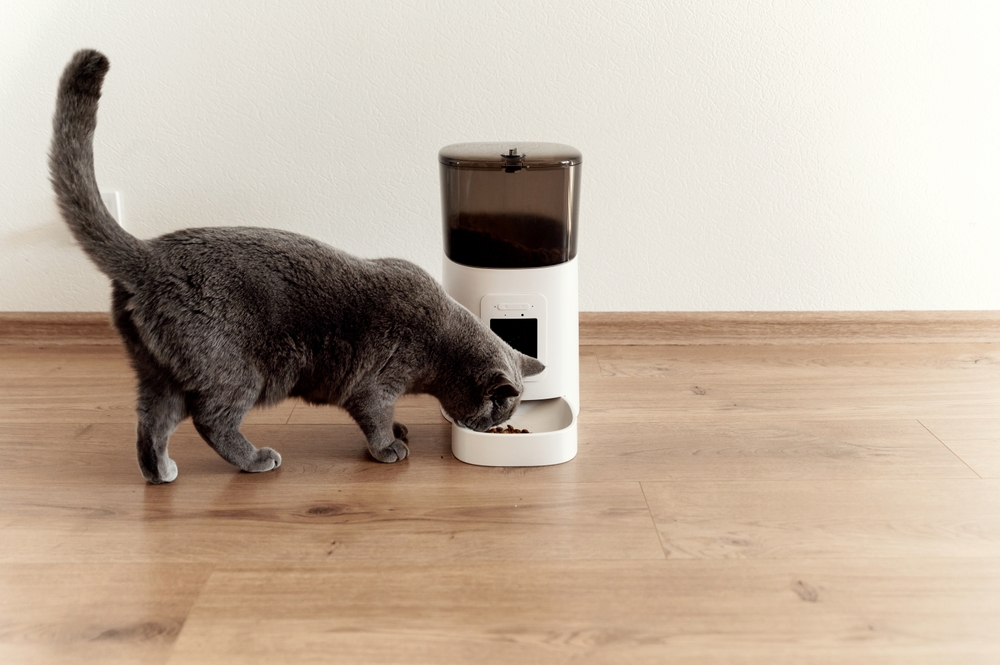
6. Leave Toys Out for Your Cat to Play With
Most cats wake at least twice during the night, and at this point, they’ll be ready to start their cycle of hunting, catching, eating, grooming, and sleeping again! If your cat can’t find anything interesting to play with because you’ve put all their toys away, then they’re probably going to come looking for you.
Leave a few of your cat’s favorite toys out so they can play with them overnight. You can even get interactive battery-operated toys that are activated by your cat’s touch.
7. Two Cats Are Better Than One
It might sound counterintuitive, but if your cat is waking you up in the night because they’re looking for someone to play with, then the answer could be another cat. Two cats are more likely to play with each other and keep themselves entertained.
Just be aware that they might make a racket as they bounce about the house, and sometimes this can be just as unsettling as your solo cat disturbing you. For some cats, though, this is a great solution.
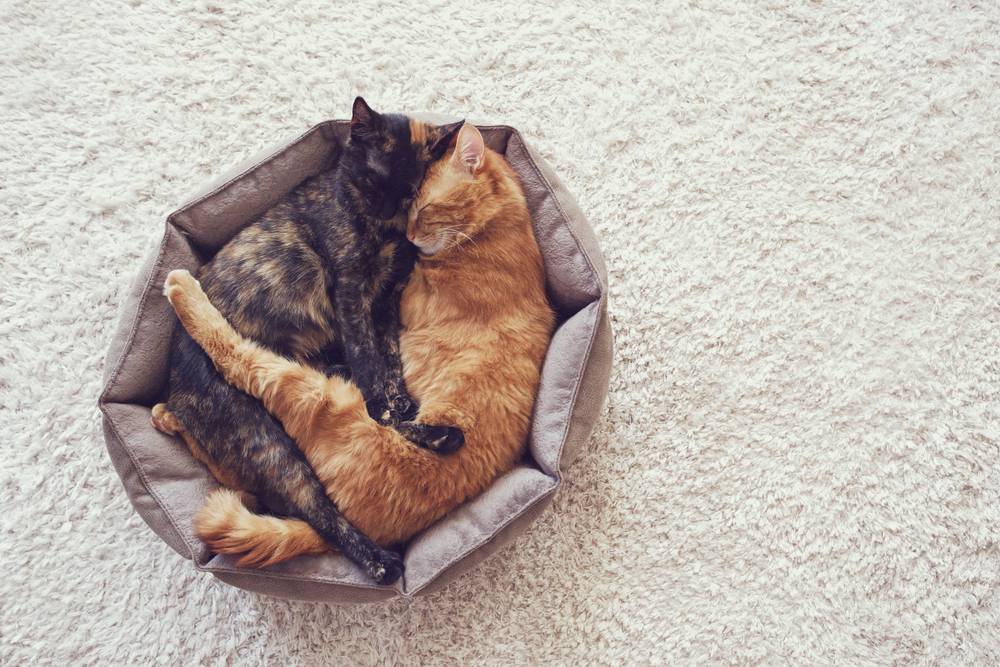
8. Use a Pheromone Diffuser or Spray
Pheromone diffusers and sprays use synthetic versions of the facial pheromone that’s produced by cats. Diffusing or spraying this around your home can have a calming effect on your cat and help them relax enough to go to sleep.
9. Provide a Safe Den for Your Cat
If your cat feels insecure because they don’t have somewhere safe to go to sleep, then they’re more likely to roam around your house at night.
Provide a variety of bed options for your cat. Many cats like the security of an igloo bed with a roof, so they can curl into a dark space.
If your cat loves to spend time up high on cat trees or bookshelves, then providing them an elevated or self-warming bed can help them feel safe enough to go to sleep.
Keeping your cat comfortable and feeling secure when you are away will have them well rested and ready to play when you return. The Hepper Nest is a modern cat bed designed to meet the specific needs of cats. Its high sides offer a sense of security and the bowl shape gives support like a warm hug from their favorite person. Learn more about why your cat will thrive in your absense with the Hepper Nest by clicking here.
At Catster, we’ve admired Hepper for many years and decided to take a controlling ownership interest so that we could benefit from the outstanding designs of this cool cat company!
10. Use a Heated Bed During Winter
If the temperature of your house drops overnight, then your cat may struggle to get warm enough to fall asleep at night. Treating them to a heated cat bed can give them the perfect cozy spot to curl up in, making them feel warm, secure, and more likely to drift off to sleep.
11. Play Relaxing Music
Some cats love to hear noises around the house, so playing relaxing music can help them drift off to sleep. You can even find cat music playlists online.
12. Take Your Cat to the Veterinarian
If your cat seems to be keeping you awake with excessive meowing rather than demands for playtime or food, then it could be that they’re in pain. If you’re in any doubt as to exactly why your cat is restless at night, then make sure you schedule a check-up with your local veterinarian. There could be an underlying issue that is causing your cat discomfort, and it’s important to get them checked out.

In Conclusion
Nobody likes getting woken up a demanding cat, so knowing how to calm a kitty down at night is very helpful! Hopefully if you try out some of the above tips, it might be the quickest solution to your problem!
See also:
Featured Image Credit: Thanaphat Somwangsakul, Shutterstock
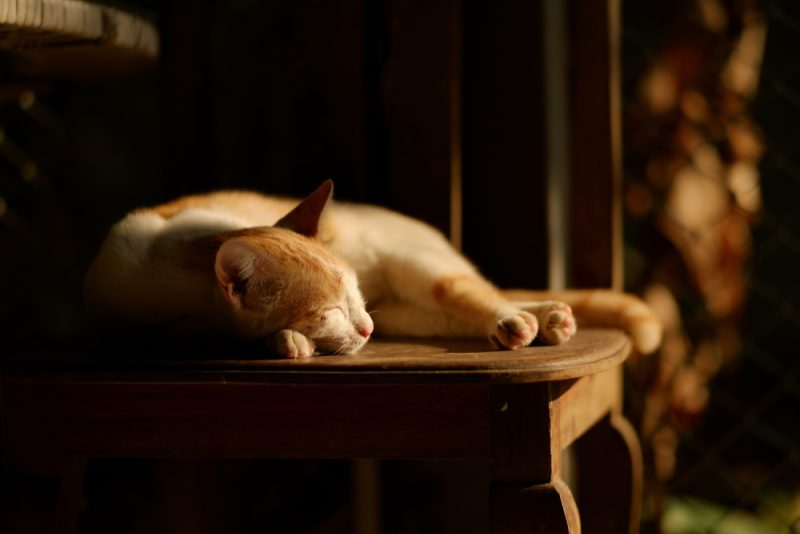









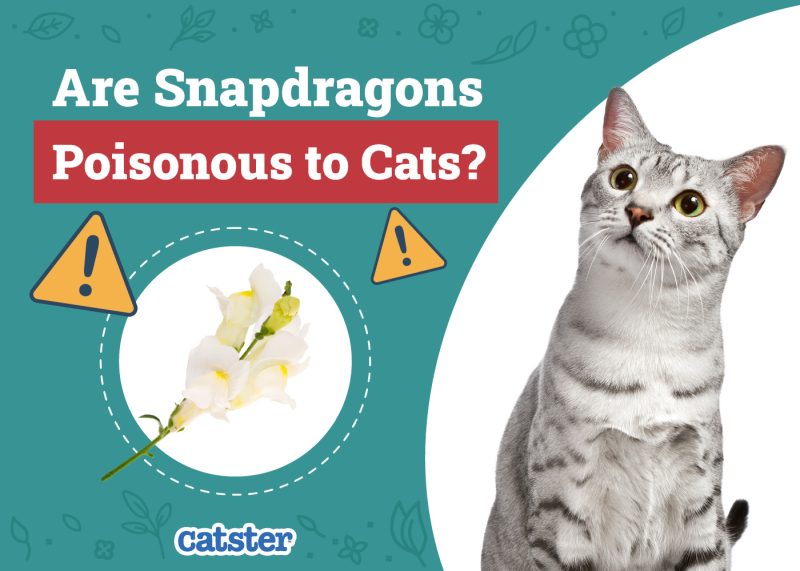

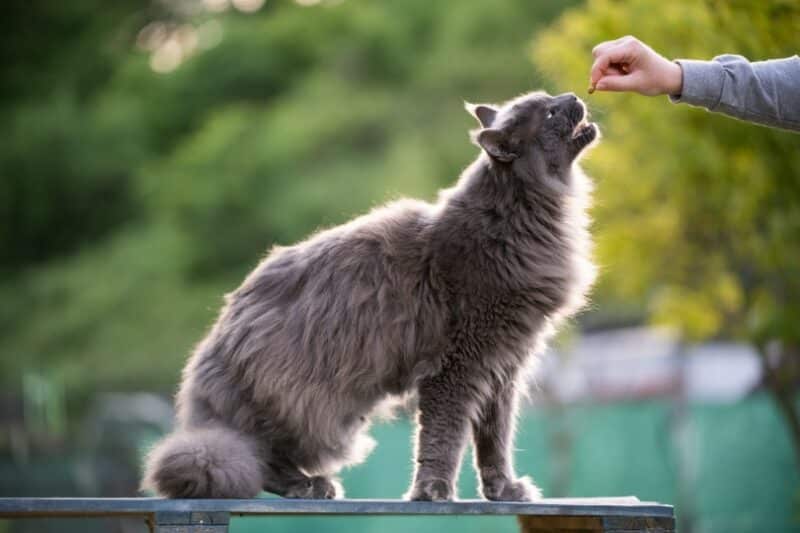



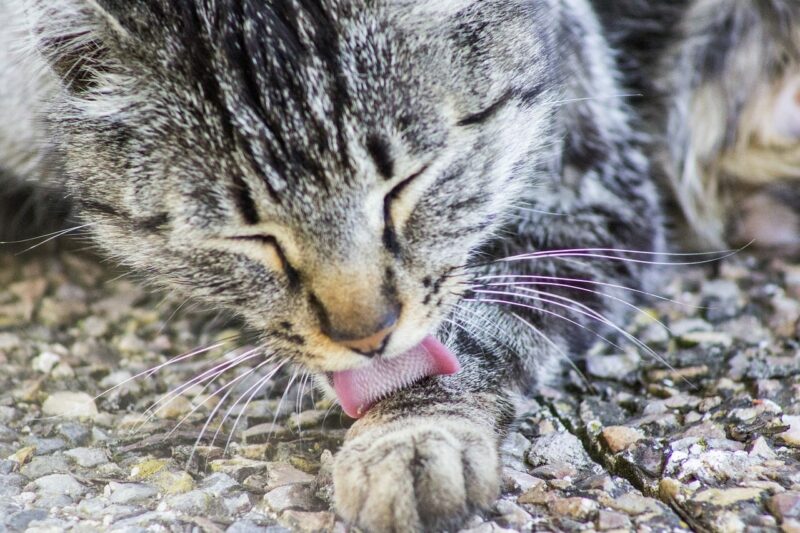





3 Responses
semi ….limited human interaction…..barn cat likely
…i had him fixed…..but he still wants to prowl at night….so I try to give him games…..have to cage him at night…however
we rescued a semi feral cat and he goes crazy at night….we have to cage him but he pees to retaliate. What can we do?
THX
Hi SUSAN KOPECKY, not sure what you mean by semi-feral. Ferals usually never get used to human interaction unless they are socialized from kittenhood or very patient humans are willing to invest years in allowing them to get used to their presence by offering food.
A great starting point would be to neuter him if you have not done it yet. Cats get very stressed if they feel trapped, caging them every night is not a recommended practice. If possible provide him with a room with some enrichment, food, water, a bed, and a litterbox. Synthetic pheromone diffusers can help to calm him down. If you wish to get guidance directly from a vet you can get support at www.pangovet.com they will give you the best advice.